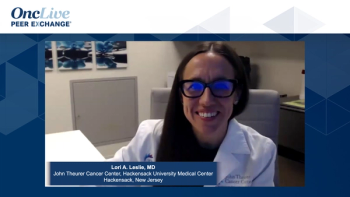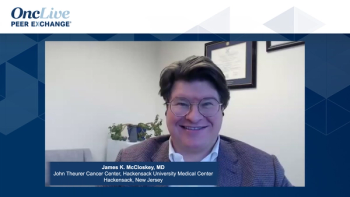
Focusing on mantle cell lymphoma, Lori A. Leslie, MD, reviews the primary analysis of the SYMPATICO trial investigating ibrutinib-venetoclax combination therapy.

Your AI-Trained Oncology Knowledge Connection!


Focusing on mantle cell lymphoma, Lori A. Leslie, MD, reviews the primary analysis of the SYMPATICO trial investigating ibrutinib-venetoclax combination therapy.

Dr Leslie discusses two abstracts on axi-cel recently presented at ASH 2023: a subgroup analysis of ZUMA-7 and the 4-year follow-up from ZUMA-5.

A hematologist-oncologist discusses a recent abstract looking at subcutaneous mosunetuzumab in the first line for patients with follicular lymphoma.

Lori A. Leslie, MD, a specialist in lymphoma, provides an overview of recent changes in the overall treatment landscape.

Dr McCloskey highlights challenges in adverse event management and discusses unmet needs in the treatment of patients with leukemia.

James K. McCloskey, MD, provides an overview of key takeaways from recent studies presented at the 2023 ASH Annual Meeting in leukemia.

An expert on leukemia provides comprehensive insights on the subgroup analysis of the phase 3 PhALLCON study of ponatinib in Ph+ acute lymphoblastic leukemia.

Focusing on chronic myeloid leukemia, James K. McCloskey, MD, reviews the long-term results of the OPTIC trial presented at ASH 2023.

Tatyana Feldman, MD, discusses the TRANSCEND CLL 004 trial in patients with relapsed/refractory chronic lymphocytic leukemia or small lymphocytic lymphoma.

Andre H. Goy, MD, discusses how the ZUMA-18 trial data support the benefit of earlier-line use of brexucabtagene autoleucel in mantle cell lymphoma.

Following ASH 2023, a hematologist-oncologist discusses recent updates on approved and emerging therapies for patients with leukemia, highlighting the TRANSFORM-1 trial looking at navitoclax plus ruxolitinib.

James K. McCloskey, MD, a specialist in leukemia, discusses how the treatment landscape has changed in recent years.

Tatyana Feldman, MD, highlights updated data for liso-cel in relapsed/refractory chronic lymphocytic leukemia/small lymphocytic lymphoma.

Burton Eliot Appel, MD, discusses the importance of recognizing Childhood Cancer Day in pediatric patients with cancer.

Burton Eliot Appel, MD, discusses the significance of International Childhood Cancer Day.

Burton Eliot Appel, MD, discusses the landscape of pediatric oncology on International Childhood Cancer Day.

Andre Goy, MD, discusses the evaluation of brexu-cel in the ZUMA-2 and expanded access ZUMA-18 trials in relapsed/refractory mantle cell lymphoma.

Tatyana Feldman, MD, discusses the launch of the TRANSCEND CLL 004 trial in relapsed/refractory chronic lymphocytic leukemia/small lymphocytic lymphoma.

David Samuel Dicapua Siegel, MD, discusses a trial of carfilzomib, iberdomide, and dexamethasone in newly diagnosed, transplant-eligible multiple myeloma.

David Samuel Dicapua Siegel, MD, discusses the importance of closing the gaps in cancer care and spreading awareness of current treatment inequities in oncology through campaigns such as World Cancer Day.

David Samuel Dicapua Siegel, MD, discusses the potential use of carfilzomib, iberdomide, and dexamethasone in newly diagnosed multiple myeloma.

David Samuel Dicapua Siegel, MD, emphasizes the importance of real-world evidence when treating patients with relapsed/refractory multiple myeloma.

Andrew Ip, MD, discusses findings from a study on the use of next-generation sequencing of flow cytometry CD markers and machine learning as a replacement to flow cytometry analysis for the diagnosis of hematologic neoplasms.

Lori A. Leslie, MD, discusses the significance of the FDA approval of pirtobrutinib for patients with pretreated chronic lymphocytic leukemia or small lymphocytic lymphoma.

Lori A. Leslie, MD, discusses the significance of the FDA approval of pirtobrutinib for this population alongside the unmet needs it may address, highlights the efficacy and notable toxicities seen with the agent in the BRUIN study, and expands on the continued investigation of pirtobrutinib vs other standard-of-care regimens in various CLL subtypes.

Tatyana Feldman, MD, discusses updated safety and efficacy data from the phase 1/2 TRANSCEND CLL 004 trial in patients with relapsed/refractory chronic lymphocytic leukemia or small lymphocytic lymphoma.

Lori A. Leslie, MD, discusses the efficacy and safety of second-line axicabtagene ciloleucel in elderly patients with high-risk, relapsed/refractory large B-cell lymphoma.

Andre Goy, MD, discusses the prevalence of high-risk clinical features in patients with mantle cell lymphoma and their influence on treatment approaches.

Adnan F. Danish, MD, discusses findings from a study evaluating the prevalence of patients with high-risk non-Hodgkin lymphoma who were eligible for bridging radiation therapy prior to receiving CAR T-cell therapy, as well as the outcomes of these patients following CAR T-cell therapy.

Lori A. Leslie, MD, discusses the benefits of implementing CAR T-cell therapy programs for patients with hematologic malignancies and highlights the successes with administering CAR T-cell therapy that JTCC has experienced.